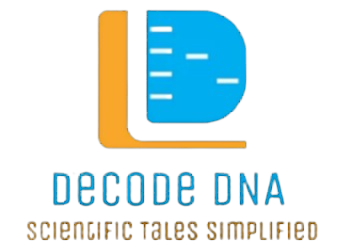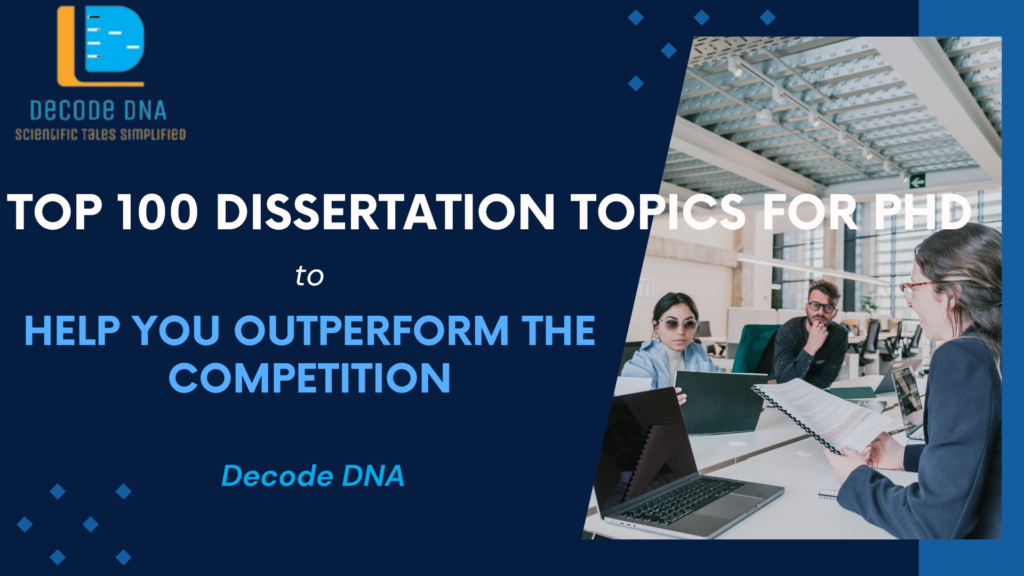Breakthrough innovations in product development and technology, attributed to modern biotechnology, have significantly contributed to advancing a cleaner and more sustainable world. The progress in developing a more efficient industrial manufacturing base can be chiefly attributed to biotechnology. Additionally, it plays a crucial role in producing clean energy, addressing global hunger concerns while minimizing environmental impact, and aiding in the battle against rare and debilitating diseases.
Our biotechnology-focused assignment writing services encompass a wide range of Dissertation Topics for PhD that assess and validate students’ skill sets, leading to the attainment of their respective degrees.
Our list of 100 dissertation topics for you
We compiled this extensive list of the top 100 Dissertation Topics for PhD to assist students in selecting efficient time management techniques. We have observed many instances where the majority of students face problems choosing a suitable topic.
So, here we attempt to simplify things for the students. This list will assist students in conserving time and energy so they can make the most of the allotted time to prepare the assignment’s material around their chosen topic.
- Effective management of renewable energy technology to promote a village.
- The production of ethanol with the help of molasses, as well as its effluent treatment.
- Different methods and aspects of evapotranspiration.
- The scattering parameters of the circulator in biotechnology.
- The inactivation of the mammalian TLR2 through an inhibitory antibody.
- Number of proteins in Mycobacterium tuberculosis.
- Recognition and classification of the genes shaping the plant responses to salinity and drought
- The role of small signaling molecules in plant responses to salinity and drought
- Genetic improvement of plant tolerance to salinity and drought.
- Pharmacogenomics of drug transporters
- Pharmacogenomics of anticancer drugs
- Pharmacogenomics of antihypertensive drugs.
- Indel genotyping of African populations
- Y-chromosome genotyping of African populations
- Profiling DNA isolated from historical crime scenes: Discuss in terms of the South African Innocence Project
- Nanotechnology methods for DNA isolation.
- Nanotechnology applications in DNA genotyping.
- Recognition of heavy metal-tolerant and sensitive genotypes
- Features of genes involved in heavy metal tolerance.
- DNA authentication of animal species in commercially reared raw meat products
- Molecular-based technology for rapid identification and detection of foodborne pathogens in complex food systems.
- Making an assessment of cancer-specific peptides for successful implementation in cancer diagnosis.
- Development of a quantum dot-based detection system for successful breast cancer diagnosis.
- Targeted delivery of embelin to cancer cells
- Assessing the role of novel quinone compounds as anticancer agents.
- Therapeutic approaches to HIV treatment and the role of nanotechnology
- Assessing the medicinal value of natural antioxidants
- In-depth study of the structure of COVID spike proteins
- Assessing the immune response to stem cell therapy.
- The use of CRISPR-Cas9 technology for genome editing.
- Tissue engineering and drug delivery using Chitosan
- Assessing the therapeutic effects of cancer vaccines.
- Utilizing PacBio sequencing for genome assembly of model organisms.
- Studying the relationship between mRNA suppression and its impact on the expansion of the stem cell
- Using biomimicry to identify tumor cells
- Sub-classifying and characterizing yellow enzymes.
- Producing hypoallergenic fermented foods.
- Producing hypoallergenic milk.
- Purifying a thermostable phytase.
- Bioconversion of cellulose to yield industrially significant products.
- CRISPR-Cas9 technology to aid in the process of editing the genome
- Using fungal enzymes in the production of chemical glue.
- Examining inhibitors of exocellulase and endocellulase.
- Discussing the utility of microorganisms in recovering shale gas.
- Discussing the in-depth study of natural decomposition processes.
- Discussing the process of recycling biowaste.
- Enhancing bioremediation for oil spill cases.
- Biosorbing gold using Cyanobacterium
- Maintaining a healthy balance between biotic and abiotic factors with biotechnological tools
- Labeling mercury levels in fish with markers.
- Exploring the biotechnological potential of jellyfish-related microbiome
- What is the potential of marine fungi in degrading polymers and plastics?
- Discussing the biotechnological potential of dinoflagellates.
- Tracing endosulfan residues in agricultural products with biotechnology
- Developing the ELISA technique for identifying crop viruses.
- Boosting the quality of drinking water with the help of an E. coli consortium.
- The characterization of E.coli isolated from the feces of zoo animals
- Improving crop resistance against insect invasions
- Reducing agricultural spending with effective biotools.
- What are the most effective steps to reduce soil erosion using biotechnology-derived tools?
- How can biotechnology improve vitamin levels in GM foods?
- Improving pesticide delivery with biotechnology
- Comparing folate biofortification in different types of crops
- Discussing photovoltaic-based production of ocean crops
- How does the application of nanotechnology improve agricultural activities?
- Examining water stress tolerance mechanisms in model plants
- Testing and producing human immune boosters in experimental organisms
- Comparing genomic analysis with bioinformatics tools
- Sequencing arabinogalactan proteins and their utility in computational methods.
- Evaluating and interpreting the gut microbiota in model organisms
- Comparing different techniques of protein purification: A comparative analysis.
- Diagnosing microbes and their role in oligonucleotide microarrays.
- Applying various techniques in biomedical research, including microarray technology.
- Applying microbial consortiums to produce the greenhouse effect.
- Computational assessment of proteins accessed from marine microbiota.
- E.coli gene mapping with the application of various microbial tools.
- Enhancing cyanobacteria strains with gene sequencing.
- Computational assessment and description of naturally occurring crystallized proteins
- mTERF protein and its application to terminate the transcription of mitochondrial DNA in algae.
- Using reverse phase column chromatography to separate proteins.
- The study of the various proteins present within Mycobacterium leprae.
- An assessment of the strategies that are ideally suitable for the successful cloning of RNA
- Discuss the common failures of biotechnology in saving the environment and ecology.
- Is there a way to make medicinal plants free of pests? Discuss
- What are the harms imposed by pest-resistant crops on humans and birds?
- What are the diverse fields of biotechnology that remain unexplored in terms of research?
- What is the future of biotechnology in the field of medicine?
- The application of recombinant DNA technology in the invention of new forms of medicine.
- Why is the strain of bacteria used to create a vaccine with the help of biotechnology?
- How can biotechnology help in the creation of medicines that are more resistant towards the mutating forms of viruses and bacteria?
- Can there be a permanent cure for cancer in the future? How can biotechnology play a decisive role in it?
- Why is it critical for students to effectively remember DNA coding in the field of biotechnology?
- How can one make hybrid seeds with the help of biotechnology?
- How can one generate pest-resistant seeds, and what are their benefits in the end yield in agriculture?
- Discuss biomagnification and its impact on ecology.
- What are the reasons that ecologists disapprove of the usage of pest-resistant seeds, despite their use in the field of agriculture?
- How has biotechnology positively influenced the lives of farmers in developing economies?
- How does biotechnology function to increase the yield of crop plants?
- Discuss the role of biotechnology in boosting the output of seasonal crops.
- Are there adverse effects of medicines in pharmacology when manufactured with biotechnological principles? Throw some light on the question with real-life cases.
Now that we have reached the conclusion of the list, we really believe that it has fulfilled the conditions for topic selection.
Wrapping up
The field of biotechnology is expected to provide numerous opportunities for study. Successfully completing a degree in one or more biotechnology programs can guarantee employment prospects in various research and development firms. The goal of providing this list of Dissertation Topics for PhD is to assist you in choosing the best subject quickly, allowing you to devote extra time to research and quality content writing. Going beyond the norm in your work can guarantee the good grades needed to outperform the competition.


Pingback: Find The Right Balance: Is The PhD Topic A Good Fit For You? - Decode DNA